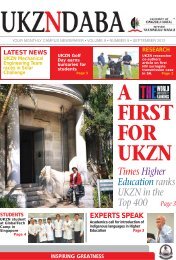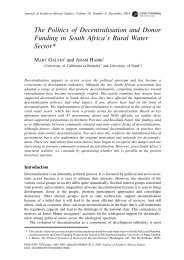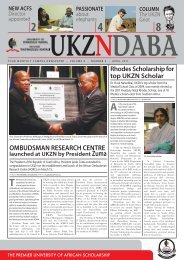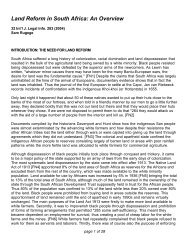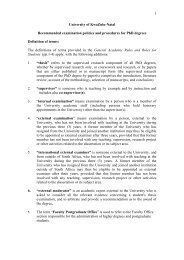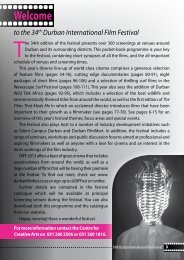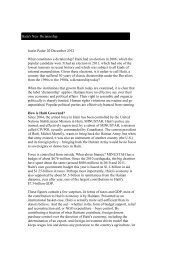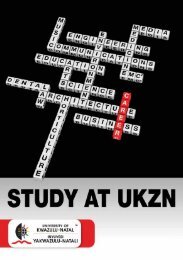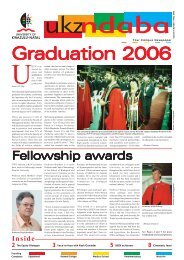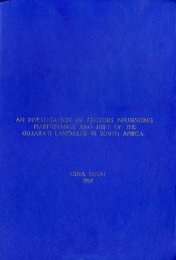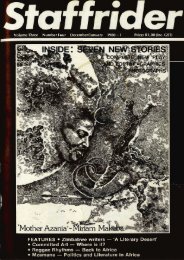meeting we — the LiteMaster workers — approachedmanagement to ask for an agreement, to see if they wouldwork with MAWU. The management was still working withthe liaison committee. We asked the question: 'Who electsthe shop stewards and the liaison committee?' We also havethe right to remove them. We asked the liaison committee:'What good have you done for workers?'They answered: 'We have persuaded management to buildgood toilets. We have asked them to build a canteen wherewe can have meals with the white workers. We have askedthem to make good gardens around the factory.' I answered:'We have toilets in the location or you can answer the call inthe veld. We are here to work, not to eat — we eat in thelocation. We are not here to relax in green gardens and lookat beautiful flowers. What have you done for workers?'A union member makes a point at a meeting.the Stores. We worked hard in that department — with barehands and wearing only dustcoats.There was a misunderstanding over bonuses. I refused R7because I was working hard. This was increased to R21. Itwas coming only to me — not to the others. They tried tokeep me quiet. At this time they were moving me arounddepartments to work on sorting. This was 1977. I wasconnected with some black consciousness guys and theyshowed me how to secure the position for blacks.JOINING OUR UNIONI had read about the Natal Metal union joining our union inthe newspaper Ilanga. There was a guy from Salcast inBenoni and he took me to the Bree Street offices of theFOSATU Project. (The FOSATU Project was set up torecruit members before extending industrial affiliates in theEast Rand). There I met an organiser, Aaron Mati, whoexplained how the employers rob the workers and abouttrade unions. Andreas and I joined. When we got back to thefactory we recruited five guys and took them to the officesin Johannesburg. They also joined. After that we spread it toall the workers. I was called in to see the foreman, MrLampke. He told me that if I was not satisfied with the jobI must go and find another. I replied that if he was not happyhe should look for another job as well.This was 1979. With so many guys joining we withdrewfrom the FOSATU Project to join MAWU. It was difficultto speak to workers about the union. But at this timemanagement tried to bring in its own union and this gave usa chance, a platform to explain what a union was.From 1979 secret meetings were held outside the factoryat lunchtime with Moses Mayekiso of MAWU. We wereformulating ways of organising the workers inside thefactory. On Saturdays we would visit the MAWU offices toask what is a union, what will it do for the workers. Asmembership grew we met on alternate Saturdays inJohannesburg and in the locations — at Kwesime Hostel andthen Intokoza Higher Primary School.By this time management knew what was going on andsome people were speaking evil to them about me.One day at Kwesime Hostel in Katlehong we wereconfronted by the police. They gave us fifteen minutes toget out. Our membership was very high there. At thefollowing meeting in Johannesburg we elected shop stewardsand met with shop stewards from Scaw Metals, NationalSprings and Henred Fruehauf. In 1980 the office wasopened at Morena near Katlehong and after that we startedto hold local shop steward council meetings.At this time Moses Mayekiso and I planned a meeting atthe Hall in the location and sent out pamphlets. The purposewas to organise all the workers of Germiston. After theTHEY TRIED TO CONFUSE THE WORKERSWhen management tried to get us to work with the liaisoncommittee we refused. There they tried to confuse workers.Gerald Mamabolo, the personnel officer, was sent to askworkers if they knew about MAWU and to tell them therewas already a union and it was the same thing. In the endthere was a vote of workers. Out of 300 workers only 19voted for the liaison committee. The rest voted for the shopstewards. From then on we met with management, This wasin 1981.At the first meeting with management we demanded aminimum of R2.00 per hour and an increase of twenty centsper hour across the board. The company told us they hadno money. We fought vigorously. We knew production wasgoing well. At the second meeting they said they would givefive cents — not more. We reported back to members to takethe mandate after each meeting. At the third meeting theyoffered eight cents and then it was deadlock. The next daythe Technical Manager, Paul Derer, asked to meet with onlytwo of the shop stewards — myself and Gibson Xala. It wasnot easy. We pressed hard. In the end we were offered tencents.When we reported back to the workers we were mandatedto tell management that we were not satisfied and to ask theTechnical Manager to come and address the workers. Whenhe came he was asked many questions, but he could notanswer and left us standing without solutions. The workerscalled him back to explain. He then ordered us back to work,but no one moved. The shop stewards tried to speak to himagain. Paul Derer said T can fire twenty workers now andhave twenty at the gate and pay them more than you get.' Healso said we were not using our brains in asking for aminimum of R2.00 per hour. Then he said we were alldismissed.When we reported back he followed us, We told him to goback to the office and arrange our payments immediately.Then the workers all agreed to go back to work. All thishappened before 3 o'clock tea time, so it did not take long.When Paul Derer returned he pretended to be surprised tosee us working, and said he had prepared our pay packets. Hetold us that there were some elements who should be fired.At 5.00 p.m. the paymaster and the managers were waitingat the gate with the pay trolley to pay everyone out. Theworkers refused to accept this and Samson Dlamini and Iopened the gates to let workers out. Next morning —Thursday — we started work as normal but there were noclock cards. Nothing happened that day, but the foremanrecorded that we were working.SILENCE BETWEEN MANAGERS AND WORKERSOn Friday the clock cards were returned. Now there was14 STAFFRIDER, VOL. 6 NO. 2, <strong>1985</strong>
silence between management and workers. Friday afternoonwe got paid, but we were suspicious when the pay trolleystarted at the last department instead of from the office asusual. Some people's packets were not in the trolley and theywere told to go to the office for their money. Mr Xala and Iaccompanied workers to see what was going on. The vicechairmanof the shop stewards had already accepted hispacket, which included his unemployment card. Twentytwowere dismissed.THE UNION STEPS INWe informed the union. The union rep came the next weekand Stood at the gate to see management block the 22 fromentering the premises. He went with them to collect their payand to check what papers they were given to sign. This wasOctober 1981.The union then went to the Industrial Council Court todemand reinstatement. The struggle was hot; some cowardswithdrew from the movement. The dismissed peoplecontinued to meet in the Morena office to hear what washappening in the factory, and with the Industrial Council.Inside the factory we put pressure on with a go-slow. We helda meeting with MAWU officials from Cape Town andPietermaritzburg and the surrounding areas to discuss theproblem and to encourage the workers in the struggle.When management tried to get us to work overtime tocover for the dismissed workers, most people refused butmanagement approached a few individuals who agreed. Thesepeople were confronted and beaten. They were forced tostay in the factory at night. They phoned the manager forhelp with transport, but he was no help to them — he justwent back to bed. Next day they all went home, but theywould be paid for the day. I asked Paul Derer if I could alsogo home to sleep and still get paid? He asked, 'Who beat theovertime workers?'Next day we all received the December bonus and thenthe company closed down for the holidays. During that timewe contacted lawyers to continue the case. When wereturned to work in January 1982 the management was stilltalking about overtime, but now no one tried to workovertime. Management was annoyed at the case and said if Iattended I would be fired. I attended the case and on the lastday the director took me back to the factory in his car.There was no discussion, only silence. As a result of the caseall the workers were re-instated with six weeks back pay forhalf the time they were out. When they returned on Mondaythe company refused to let them in, so Mayekiso and BernieFanaroff arrived to talk with management. They said thesepeople had been fighting and stealing food from the canteenand that they only had work for three workers. Mayekisoreported back to the 22 workers. They said they were notprepared to send only three back. They had all been firedat the same time for the same reason.We reported this to the Johannesburg office, who wentback to the lawyer. The company agreed to meet the unionwith Mayekiso and Fanaroff present. The management calledin the workers and each was sent to their previous jobs. Somewere not given back their jobs: Wanda Masemola — a driver —was employed as a gardener. Livingstone Nagoxo — aninspector — was made a clerk, and Gibson Xaba was movedfrom storekeeper to parts supplier. The 22 workers receivedtheir back pay and found that money had been deducted forthe pension fund for twelve weeks.MEETING AT MORENAAfter two or three days a general meeting was held at MorenaStore when we planned to go ahead with negotiations for arecognition agreement.Negotiations were tough. We met sometimes three timesa week with management for six months; each time there wasa deadlock. The Agreement was signed on 22 July. Most ofthe problems were over grievance procedure. By this time wewere also pushing for another increase, but managementwould not agree to two sets of negotiations at once.About this time management introduced the 'value arch',with two workers from each department meeting managementto plan the jobs.AN UGLY INCIDENTThere was also an ugly incident at this time. A group ofworkers who belonged to Steel, Engineering and AlliedWorkers Union went to management complaining ofintimidation by MAWU. The management called in the policeand these workers pointed out some of our members. Mostof the shop stewards were on a training course at theUniversity; only three were left in the factory. Two werearrested. The accused were called in to the office, told therewas something wrong with their pay packets, and then put inthe police van. The third, Enoch Khowane, suspected andrefused to go to the office — so the police came into thefactory to take him. Everyone stood up and followed thepolice. The police pulled him into the van and drove off. Theworkers refused to go back to work. Management phonedthe union to complain that workers were not working. Therest of the shop stewards returned; by this time the workershad gone. Management called the stewards into the officebut we refused to go.On Monday the Elsburg police went to the location andarrested more members, including Samuel Skhosane, PeterMdonsele and Selby Shabalala. The three arrested on Fridaywere released on R300 bail, after being charged under theIntimidation Act. Six people were arrested during the week,but the company had them released because of the pressureof the workers.WE ASKED FOR EXECUTIVE CARSFrom there we demanded that management give us transportto go and lay charges against the non-MAWU people — asmanagement had given them transport. We were offered atruck. We refused and asked for the executive cars. We weretaken up to the Elsburg police station in two Mercedes, twoGolfs, six Audis, and a Ford three litre. The stationcommander tried to get us to drop charges — but we wouldnot because he had accepted the earlier case. We returned inthe cars, with the station commander, to hold talks with thecompany to settle out of court.The company said they were not responsible for thearrests. We said they had provided the transport to the policestation. The commander said he was going to stop the case.We were given papers to sign to drop our case against theothers, but we refused. When the case came up — on 4 November1982 — it was dropped. All this disturbed negotiationswhich only resumed in January 1983. Then the directorresigned and we were told there could be no morenegotiations until his replacement arrived on 1 May.In 1981 we had received the Industrial Council increaseplus ten cents. In 1982 we just received the IndustrialCouncil increase. We kept pushing management and in March1983 got twenty cents plus a promise of ten cents to be paidin July (the starting rate was R1.58 at this time). We receivedthe extra ten cents in July for one week, then we were allfired. But before this they fired the man responsible for the'value arch'. Forty were retrenched, a technical manager, MrHome, was fired because he was on our side. On the twelfthSTAFFRIDER, VOL. 6 NO. 2, <strong>1985</strong> 15



